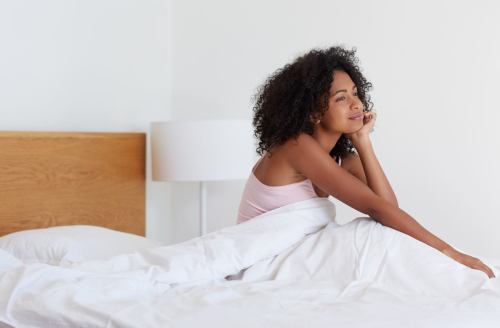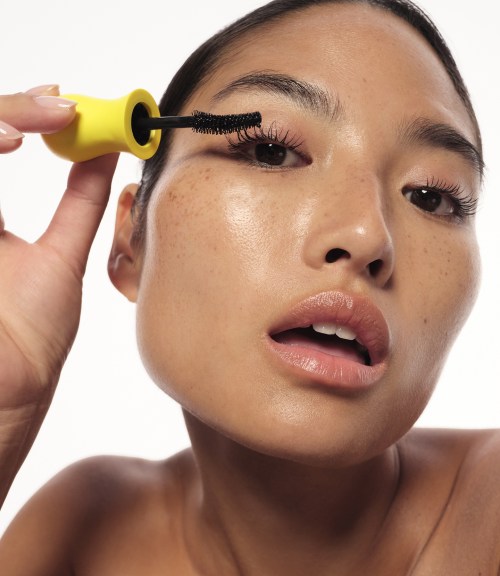PMS is the boogeyman of your menstruation cycle. In the week leading up to your period, it can feel like mood swings, bloating, cramps, back pain, and random breakouts are lurking around every corner, poised to ruin a perfectly good day. But if those unwanted symptoms persist after you’ve packed up your period cup for the month, you could be suffering from a lesser-known (and less understood) condition known as postmenstrual syndrome, aka PMS after period.
Experts in This Article
hormonal health and period expert
nurse practitioner and vice president of clinical client strategy at WINFertility
board certified physician and OB/GYN in Pearland, Texas
board-certified gynecologist and reproductive endocrinologist
Thankfully, it’s a lot more rare than premenstrual syndrome. As many as 75 percent of women experience negative symptoms before their periods, but anecdotally, only about 10 percent experience postmenstrual syndrome, according to fertility specialist Tanmoy Mukherjee, MD. Yet Nicole Jardim, a hormonal health and period expert, says that over the last few years, she’s seen an uptick in the number of clients who report this issue to her—despite the fact that it’s not really recognized by the mainstream medical establishment.
The other way in which postmenstrual syndrome is different from traditional PMS is in the types of symptoms it can bring about. Before your period, you’re potentially more focused on physical ailments like bloating and cramps (magnesium for PMS has been shown to help those symptoms, btw) and some people report that these are part of their postmenstrual experience, too. But Dr. Mukherjee says that postmenstrual syndrome is usually better known for bringing about psychological distress.
“It’s characterized by difficulty sleeping, anxiety, irritability, mood swings, and even motor symptoms that may manifest as clumsiness or lack of coordination,” he says. In the most severe cases, he adds, symptoms can look more like those associated with depression—think: highly abnormal sleep patterns, trouble concentrating, and low self-esteem.
The amount of time these PMS symptoms last after your period varies—it can take anywhere from just a couple of days to a full week before they go away.
What causes postmenstrual syndrome?
Doctors are well aware of what causes PMS—namely, it’s the result of hormonal and neurochemical fluctuations in the run-up to menstruation.
Postmenstrual syndrome, on the other hand, is more of a question mark. Dr. Mukherjee has heard a number of theories mirroring the causes of PMS, such as an excess or lack of estrogen and low levels of progesterone1, vitamin B6 deficiencies2, changes in glucose metabolism, and electrolyte imbalances3. Yet, he says, they have all since been disproven.
Although it hasn’t been researched, Dr. Murkherjee posits that those with postmenstrual syndrome might be extremely sensitive to shifts in hormone levels. He believes the syndrome could also be linked to a serotonin imbalance in the brain, since “the symptoms of postmenstrual syndrome can respond to selective serotonin reuptake inhibitors (SSRIs), which increase the amount of circulating serotonin.”
How can you deal with postmenstrual symptoms?
Since science hasn’t pinpointed an exact cause of the post-period symptoms, a definitive treatment hasn’t been determined either. Coping with postmenstrual symptoms is possible, though. If you’re unsure whether or not it’s actually affecting you, starting to track your period and then charting your daily symptoms for at least two menstrual cycles can help you understand if this is a one-off thing or a pattern that needs to be addressed.
Beyond that, Dr. Mukherjee says there are a number of ways that he treats postmenstrual syndrome, with a focus on relieving symptoms. One of the first options he often turns to is an SSRI (antidepressant) prescription since depression is one of the more serious postmenstrual side effects. If your symptoms are less severe and you want to manage them without medication, Dr. Murkhajee says that chiropractic therapy, cognitive behavioral therapy, light therapy, and acupuncture have been anecdotally found to offer relief.
PMS supplements like calcium, iron, and magnesium have been shown to help symptoms before your period, and there are also a variety of herbs for PMS that doctors say have benefits. (Pro tip: Here’s a great PMS tea recipe to soothe some of your symptoms.) Theoretically, some of the same medicines can be used to treat postmenstrual symptoms as well, but be sure to check with your own doc for your best treatment option. “Adequate sleep is key during this time, as is self-care activities and exercise,” says Texas-based OB/GYN and pH-D Feminine Health advisor Tamika Cross, MD, FACOG.
Frequently asked questions about PMS after your period
Why do I feel awful after my period ends?
Feeling low post-period doesn’t always mean you’re experiencing postmenstrual syndrome. Due to the hormonal fluctuations surrounding your cycle, you may simply be more tired during that time of the month. You have just lost some blood, so if you see a correlation again and again, it might be time to get it checked further.
“Iron levels drop after your period ends, especially if you have a heavy menstrual cycle, and this drop can leave you feeling more tired,” explains Rachel Jones, APRN, FNP, the vice president of clinical client strategy at WINFertility. “If you feel like this is happening consistently and have heavy bleeding, you may want to check in with your OB/GYN or PCP to check iron levels to see if you are anemic.”
Is post-period depression a thing?
It’s important to note that depression and mood swings are different. Due to changes in hormones, mood swings are a quite common side effect of PMS, whether before or after your period. That’s why you may feel more emotional after your period ends. “It’s a temporary phenomenon. However, if [bad mood swings are] ongoing for more than seven to 14 days post menses, it may be classified as depression and one should seek help from a healthcare professional to dig a bit deeper,” says Dr. Cross.
Why am I cramping three days after my period?
Again, this is most likely due to hormone fluctuations during your cycle. However, if you’re experiencing severe cramps, call your doctor. “If you are cramping three days after your bleeding has stopped, this may be an indicator of endometriosis. I would schedule a follow-up with your OB/GYN,” says Jones.
When should I contact my doctor?
As always, falling down the internet rabbit hole of self-diagnosis is never the way to go. So if you’re experiencing any unusual health issues at any time of the month, give your doctor a call. “If postmenstrual syndrome and its symptoms are negatively affecting your life, then I would reach out to your OB/GYN,” says Jones. “Depending on the symptom, lifestyle modifications or in certain cases, medication to treat individual symptoms may help.”
Cunningham, Joanne et al. “Update on research and treatment of premenstrual dysphoric disorder.” Harvard review of psychiatry vol. 17,2 (2009): 120-37. doi:10.1080/10673220902891836
↩︎Doll, H et al. “Pyridoxine (vitamin B6) and the premenstrual syndrome: a randomized crossover trial.” The Journal of the Royal College of General Practitioners vol. 39,326 (1989): 364-8.
↩︎Varma, T R. “Hormones and electrolytes in premenstrual syndrome.” International journal of gynaecology and obstetrics: the official organ of the International Federation of Gynaecology and Obstetrics vol. 22,1 (1984): 51-8. doi:10.1016/0020-7292(84)90104-8
↩︎
Sign Up for Our Daily Newsletter
Get all the latest in wellness, trends, food, fitness, beauty, and more delivered right to your inbox.
Got it, you've been added to our email list.











